April 1, 2022 – Day Three
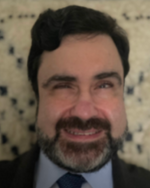 Mohammed Ali Loutfy, Ph.D., Sr. Advisor, Capacity Building and Advocacy, G3ict: Dr. Loutfy is G3ict's Director, Capacity Building and Advocacy, and is formerly the Executive Director of Disabled People's International (DPI) and an international development professional specializing in the inclusion of persons with disabilities across a wide range of developmental programming. In Fall 2019, Mohammed earned his Ph.D. in Anthropology from the American University of Washington, DC. His dissertation addressed the impact of persons with disabilities’ experiences with service providers and disability advocacy organizations in Lebanon. Prior to that in 2009 and as a Fulbright Scholar, Mohammed had earned his Master’s degree in International Development, also from the American University, where his thesis focused on evaluating the commitment of the World Bank to pursuing disability inclusion in its education funded programs. Before that in 2001, Mohammed earned his degree in Public Law from the Lebanese University in Beirut, where he focused his studies on human rights and disability. Since 2016, Mohammed has been the Representative of Disabled People’s International (DPI) at the United Nations, where he co-chairs the Stakeholder Group of Persons with Disabilities to the High Level Political Forum (HLPF) on the Sustainable Development Goals (SDGs).Since 2014, Mohammed has also served as Executive Director of the Arab Forum for the Rights of Persons with Disabilities, where he leads the forum’s strategic planning and partnership building initiatives in addition to its organizational development and policy programming.
Mohammed Ali Loutfy, Ph.D., Sr. Advisor, Capacity Building and Advocacy, G3ict: Dr. Loutfy is G3ict's Director, Capacity Building and Advocacy, and is formerly the Executive Director of Disabled People's International (DPI) and an international development professional specializing in the inclusion of persons with disabilities across a wide range of developmental programming. In Fall 2019, Mohammed earned his Ph.D. in Anthropology from the American University of Washington, DC. His dissertation addressed the impact of persons with disabilities’ experiences with service providers and disability advocacy organizations in Lebanon. Prior to that in 2009 and as a Fulbright Scholar, Mohammed had earned his Master’s degree in International Development, also from the American University, where his thesis focused on evaluating the commitment of the World Bank to pursuing disability inclusion in its education funded programs. Before that in 2001, Mohammed earned his degree in Public Law from the Lebanese University in Beirut, where he focused his studies on human rights and disability. Since 2016, Mohammed has been the Representative of Disabled People’s International (DPI) at the United Nations, where he co-chairs the Stakeholder Group of Persons with Disabilities to the High Level Political Forum (HLPF) on the Sustainable Development Goals (SDGs).Since 2014, Mohammed has also served as Executive Director of the Arab Forum for the Rights of Persons with Disabilities, where he leads the forum’s strategic planning and partnership building initiatives in addition to its organizational development and policy programming.
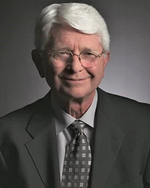 Thomas G. Broussard, Ph.D., Stroke Educator, Inc.: Thomas G. Broussard, Jr., Ph.D. is an awarded author, public speaker and three-time stroke survivor. He is a U.S. Naval Academy graduate, naval officer, naval shipbuilder, and a business owner in career development and training. He received his Ph.D. at The Heller School at Brandeis University, Waltham, MA and focused his work on supporting people with disabilities and employment. He started his company, Stroke Educator, Inc. (www.strokeeducator.com) and has published four books about stroke, aphasia, recovery and plasticity; the foundation of all learning. He is conducting a national “Aim High for Aphasia” awareness campaign dedicated to educating people about aphasia, a language disorder, typically from a stroke. About 180,000 people acquire the disorder each year, yet most people have never heard of it.
Thomas G. Broussard, Ph.D., Stroke Educator, Inc.: Thomas G. Broussard, Jr., Ph.D. is an awarded author, public speaker and three-time stroke survivor. He is a U.S. Naval Academy graduate, naval officer, naval shipbuilder, and a business owner in career development and training. He received his Ph.D. at The Heller School at Brandeis University, Waltham, MA and focused his work on supporting people with disabilities and employment. He started his company, Stroke Educator, Inc. (www.strokeeducator.com) and has published four books about stroke, aphasia, recovery and plasticity; the foundation of all learning. He is conducting a national “Aim High for Aphasia” awareness campaign dedicated to educating people about aphasia, a language disorder, typically from a stroke. About 180,000 people acquire the disorder each year, yet most people have never heard of it.
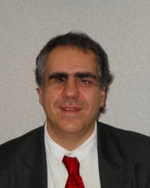 Steve Tyler, Director of Assistive Technology, Leonard Cheshire Disability: Mr. Tyler currently serves as Director of Assistive Technology at Leonard Cheshire where he has responsibility for policy, support and implementation of assistive technology solutions, services and innovations inside and outside of the organisation. He has a history of innovating sustainable and life-changing products in the accessibility arena from leading the team that developed ground-breaking synthetic speech (leading to the voice of Alexa), through to accessible TV, mobile devices, payment systems and on-line web and app accessibility initiatives. He led on the development of HTML, in the early days of the web, and more recently on EPUB and publication accessibility, data transformation processes and the creation of business to business services that deliver these. He collaborates with key players in the technology market as part of the Google Accessibility Strategy Board, the Microsoft accessibility steering group, and as a programme lead for the annual M-Enabling Summit held in Washington DC. He engages with local and international government entities on policy, with UK and European standards agencies, and is active in the broader area of accessibility to everyday goods and services. At present he is working on an enabler platform through which assessment of user needs using artificial intelligence can be carried out, on innovation in the health technology sector around monitoring and safety, and advocates at parliamentary level for new processes that allow potential users to obtain assistive devices and services. He has a background in clinical psychology, an M.B.A from CAS business School, and an interest in organisational behaviour.
Steve Tyler, Director of Assistive Technology, Leonard Cheshire Disability: Mr. Tyler currently serves as Director of Assistive Technology at Leonard Cheshire where he has responsibility for policy, support and implementation of assistive technology solutions, services and innovations inside and outside of the organisation. He has a history of innovating sustainable and life-changing products in the accessibility arena from leading the team that developed ground-breaking synthetic speech (leading to the voice of Alexa), through to accessible TV, mobile devices, payment systems and on-line web and app accessibility initiatives. He led on the development of HTML, in the early days of the web, and more recently on EPUB and publication accessibility, data transformation processes and the creation of business to business services that deliver these. He collaborates with key players in the technology market as part of the Google Accessibility Strategy Board, the Microsoft accessibility steering group, and as a programme lead for the annual M-Enabling Summit held in Washington DC. He engages with local and international government entities on policy, with UK and European standards agencies, and is active in the broader area of accessibility to everyday goods and services. At present he is working on an enabler platform through which assessment of user needs using artificial intelligence can be carried out, on innovation in the health technology sector around monitoring and safety, and advocates at parliamentary level for new processes that allow potential users to obtain assistive devices and services. He has a background in clinical psychology, an M.B.A from CAS business School, and an interest in organisational behaviour.
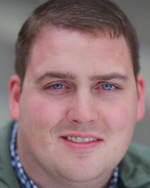 Ian Burkhart, President, Ian Burkhart Foundation: Ian is a C5 tetraplegic from a diving accident in 2010. He has participated in multiple clinical trials, including using a brain-computer interface to control muscle stimulation. Ian has been a member of the North American Spinal Cord Injury Consortium since its inception, he currently serves as Vice President and chairs the project review committee. He has also worked with Unite2Fight Paralysis to advocate for $6 million of SCI research in his home state of Ohio. Ian has been a Reeve peer mentor since 2015 and helps lead two local SCI networking groups. As the president of the Ian Burkhart Foundation, he raises funds for accessible equipment for the independence of others with SCI. Ian is also a full-time consultant working with multiple medical device companies.
Ian Burkhart, President, Ian Burkhart Foundation: Ian is a C5 tetraplegic from a diving accident in 2010. He has participated in multiple clinical trials, including using a brain-computer interface to control muscle stimulation. Ian has been a member of the North American Spinal Cord Injury Consortium since its inception, he currently serves as Vice President and chairs the project review committee. He has also worked with Unite2Fight Paralysis to advocate for $6 million of SCI research in his home state of Ohio. Ian has been a Reeve peer mentor since 2015 and helps lead two local SCI networking groups. As the president of the Ian Burkhart Foundation, he raises funds for accessible equipment for the independence of others with SCI. Ian is also a full-time consultant working with multiple medical device companies.
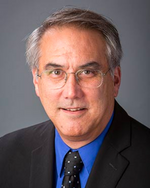 Roger O. Smith, Ph.D., Professor, Occupational Sciences & Technology, College of Health Sciences, University of Wisconsin-Milwaukee and Director of the Rehabilitation Research Design & Disability (R2D2) Center:
Roger O. Smith, Ph.D., Professor, Occupational Sciences & Technology, College of Health Sciences, University of Wisconsin-Milwaukee and Director of the Rehabilitation Research Design & Disability (R2D2) Center:
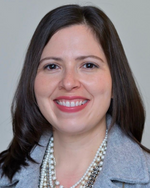 Khara Ramos, Ph.D., Vice President, Dana Foundation, former NIH Neuroethics Director: Dr. Khara Ramos, Ph.D., is the Vice President of Neuroscience within Society at the Dana Foundation. A neuroscientist with extensive scientific management and communications expertise, Dr. Ramos oversees the Foundation’s strategy and programs in that area. Before joining the Dana Foundation, Dr. Ramos was the inaugural director of the neuroethics program and lead the neuroscience content and strategy branch in the communications office at the National Institutes of Neurological Disorders and Stroke (NINDS) at the National Institutes of Health (NIH). Dr. Ramos was instrumental in establishing the rapid growth of neuroethics efforts for the NIH BRAIN Initiative, positioning the NIH as a global leader in the emerging field of neuroethics. She managed a neuroethics research program, an expert working group, partnerships, bioethics and biomedical integration, and other initiatives. She also served as co-chair of the NIH Coordinating Committee for Bioethics Research and Training. Prior to NINDS, Dr. Ramos worked as special assistant to the deputy director of the National Institute of Dental and Craniofacial Research. She originally moved from academia to federal service through the AAAS Science and Technology Policy Fellowship Program, following a post-doctoral fellowship at the University of Colorado, Boulder, where she studied the role of non-neuronal cells of the central nervous system in chronic pain and opioid-induced central sensitization. Dr. Ramos holds a Ph.D. in neurosciences from the University of California, San Diego, and a bachelor’s degree with honors in Symbolic Systems from Stanford University.
Khara Ramos, Ph.D., Vice President, Dana Foundation, former NIH Neuroethics Director: Dr. Khara Ramos, Ph.D., is the Vice President of Neuroscience within Society at the Dana Foundation. A neuroscientist with extensive scientific management and communications expertise, Dr. Ramos oversees the Foundation’s strategy and programs in that area. Before joining the Dana Foundation, Dr. Ramos was the inaugural director of the neuroethics program and lead the neuroscience content and strategy branch in the communications office at the National Institutes of Neurological Disorders and Stroke (NINDS) at the National Institutes of Health (NIH). Dr. Ramos was instrumental in establishing the rapid growth of neuroethics efforts for the NIH BRAIN Initiative, positioning the NIH as a global leader in the emerging field of neuroethics. She managed a neuroethics research program, an expert working group, partnerships, bioethics and biomedical integration, and other initiatives. She also served as co-chair of the NIH Coordinating Committee for Bioethics Research and Training. Prior to NINDS, Dr. Ramos worked as special assistant to the deputy director of the National Institute of Dental and Craniofacial Research. She originally moved from academia to federal service through the AAAS Science and Technology Policy Fellowship Program, following a post-doctoral fellowship at the University of Colorado, Boulder, where she studied the role of non-neuronal cells of the central nervous system in chronic pain and opioid-induced central sensitization. Dr. Ramos holds a Ph.D. in neurosciences from the University of California, San Diego, and a bachelor’s degree with honors in Symbolic Systems from Stanford University.
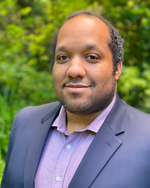 Timothy Brown, Ph.D., Assistant Professor, Department of Bioethics & Humanities, University of Washington, School of Medicine: Dr. Brown is now an Assistant Professor in the Department of Bioethics and Humanities. He is long-time contributor to the Center for Neurotechnology's (CNT) Neuroethics Thrust—where he supports efforts to teach neuroethics to young investigators, catalyze ethics investigations through interdisciplinary collaborations, and promote the field of neuroethics through public outreach. More generally, Tim's work lies at the intersection of biomedical ethics, philosophy of technology, (black/latinx/queer) feminism, and aesthetics.
Timothy Brown, Ph.D., Assistant Professor, Department of Bioethics & Humanities, University of Washington, School of Medicine: Dr. Brown is now an Assistant Professor in the Department of Bioethics and Humanities. He is long-time contributor to the Center for Neurotechnology's (CNT) Neuroethics Thrust—where he supports efforts to teach neuroethics to young investigators, catalyze ethics investigations through interdisciplinary collaborations, and promote the field of neuroethics through public outreach. More generally, Tim's work lies at the intersection of biomedical ethics, philosophy of technology, (black/latinx/queer) feminism, and aesthetics.
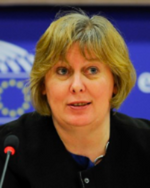 Lidia Best, President, European Federation of Hard of Hearing People, ITU JCA-AHF (International Telecommunication Union Joint Coordination Activities on Accessibility and Human Factors): Lidia is President at European Federation of Hard of Hearing People and Vice-Chairman of ITU JCA-AHF (International Telecommunication Union Joint Coordination Activities on Accessibility and Human Factors) and internationally recognized accessibility expert and advocate for persons who are deaf or hard of hearing. She brings unique knowledge as an expert with lived experience, as a person who is hard of hearing and a cochlear implant user since 2009. Her work has specific focus on accessibility and quality of hearing care for deaf and hard of hearing people including policy development, training, and consulting. She contributed to work on standards as a member of G3ict delegation to ITU in telecoms, captioning and assistive listening devices , having authored the ITU FSTP-RCSO “Overview of remote captioning services" and H.871“Safety requirements for wearable audio augmenting devices” the recommendation on personal sound amplifiers. After 10 years, Lidia stepped down from her position of the Vice-President of the EFHOH (European Federation of Hard of Hearing) in 2020 to concentrate on international advocacy work which includes WHO World Hearing Forum. While at EFHOH she was co-author of reports into situation of hard of hearing and deafened people in Europe in areas of employment, hearing care and accessibility. In UK, Lidia is a Chairman of the National Association of Deafened People (NADP).
Lidia Best, President, European Federation of Hard of Hearing People, ITU JCA-AHF (International Telecommunication Union Joint Coordination Activities on Accessibility and Human Factors): Lidia is President at European Federation of Hard of Hearing People and Vice-Chairman of ITU JCA-AHF (International Telecommunication Union Joint Coordination Activities on Accessibility and Human Factors) and internationally recognized accessibility expert and advocate for persons who are deaf or hard of hearing. She brings unique knowledge as an expert with lived experience, as a person who is hard of hearing and a cochlear implant user since 2009. Her work has specific focus on accessibility and quality of hearing care for deaf and hard of hearing people including policy development, training, and consulting. She contributed to work on standards as a member of G3ict delegation to ITU in telecoms, captioning and assistive listening devices , having authored the ITU FSTP-RCSO “Overview of remote captioning services" and H.871“Safety requirements for wearable audio augmenting devices” the recommendation on personal sound amplifiers. After 10 years, Lidia stepped down from her position of the Vice-President of the EFHOH (European Federation of Hard of Hearing) in 2020 to concentrate on international advocacy work which includes WHO World Hearing Forum. While at EFHOH she was co-author of reports into situation of hard of hearing and deafened people in Europe in areas of employment, hearing care and accessibility. In UK, Lidia is a Chairman of the National Association of Deafened People (NADP).